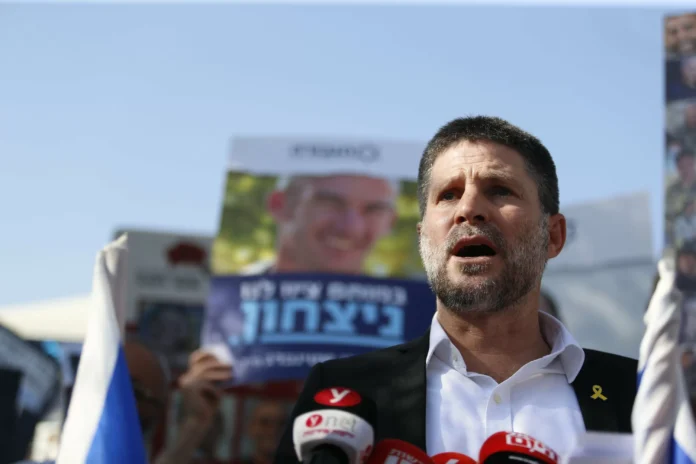Israel’s far-right Finance Minister Bezalel Smotrich has recently made headlines with his controversial statement, threatening to set up a new settlement for every country that recognizes Palestinian statehood. This bold statement has sparked a heated debate and raised concerns among both Israeli and Palestinian communities.
In a recent interview, Smotrich stated that “for every country that unilaterally recognizes a Palestinian state, we will build a new settlement in the heart of our ancestral homeland.” This statement has been met with mixed reactions, with some applauding Smotrich’s determination to protect Israel’s sovereignty, while others criticize his aggressive approach.
Smotrich, a member of the Union of Right-Wing Parties, is known for his hard-line stance on the Israeli-Palestinian conflict. He is a strong advocate for the expansion of Israeli settlements in the occupied territories, which are considered illegal under international law. His latest statement has only added fuel to the already burning fire of the conflict.
The timing of Smotrich’s statement is significant, as it comes amidst a series of events that have put the Israeli-Palestinian conflict back in the international spotlight. In recent months, several countries, including Ireland, Belgium, and Luxembourg, have recognized Palestine as a state, with more countries expected to follow suit. This move has been welcomed by the Palestinian Authority, who sees it as a step towards achieving their long-standing goal of statehood.
However, Smotrich’s statement has been met with strong criticism from the international community. The European Union has expressed concern over the potential consequences of such actions, stating that it could further escalate tensions in the region and hinder the prospects of a peaceful resolution to the conflict.
Many also argue that Smotrich’s statement goes against the longstanding policy of the Israeli government, which has always maintained that the issue of settlements should be resolved through negotiations with the Palestinians. The United Nations has repeatedly condemned the expansion of Israeli settlements, stating that it undermines the possibility of a two-state solution.
Despite the criticism, Smotrich remains steadfast in his stance, arguing that the establishment of new settlements is crucial for Israel’s security and the protection of its borders. He believes that the recognition of a Palestinian state would only lead to more violence and instability in the region.
The Palestinian Authority has condemned Smotrich’s statement, calling it a blatant violation of international law and a hindrance to the peace process. They argue that the expansion of settlements only serves to further entrench the occupation and make it more difficult to achieve a viable Palestinian state.
The issue of settlements has been a major obstacle in the Israeli-Palestinian conflict for decades. The construction of settlements in the occupied territories has been a source of tension and violence, with Palestinians viewing it as a land grab and a violation of their rights. The international community has also repeatedly called for a halt to settlement construction, stating that it undermines the possibility of a two-state solution.
In light of Smotrich’s statement, it is crucial for both sides to engage in constructive dialogue and find a peaceful resolution to the conflict. The establishment of new settlements will only serve to further complicate the situation and hinder the prospects of a lasting peace.
It is also important for the international community to play a more active role in finding a solution to the conflict. The recognition of a Palestinian state by individual countries may seem like a step in the right direction, but it must be accompanied by efforts to bring both sides to the negotiating table and find a mutually acceptable solution.
In conclusion, Smotrich’s statement has sparked a heated debate and raised concerns about the future of the Israeli-Palestinian conflict. While his determination to protect Israel’s sovereignty is commendable, his aggressive approach is not the solution. It is time for both sides to engage in constructive dialogue and find a peaceful resolution to the conflict, with the support of the international community. Only through cooperation and compromise can a lasting peace be achieved in the region.


